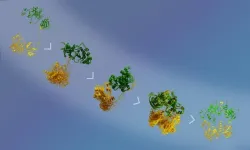(Press-News.org) Vocal learning complexity, or the ability to imitate sounds, is associated with better problem-solving abilities and larger brains in songbird species, according to a new study. Whether vocal learning complexity was linked with such cognitive phenotypes was previously unknown. The approach used in the study, to study a lineage of birds, serves as a model for testing similar patterns in other vocal learning species. Complex vocal learning – the ability to imitate heard sounds – is a crucial component of human spoken language and has been assumed to be associated with more advanced cognitive abilities. Outside of humans, it has been observed in a small number of taxa, including songbirds. However, while vocal learning taxa that display the most complex vocal learning behaviors are often also thought to exhibit more intelligent cognitive capacities, the association – if any – has not been quantitively tested across species. To test whether there is a linkage between vocal learning complexity and other cognitive or physiological traits, Jean-Nicolas Audet and colleagues performed a suite of behavioral experiments across 214 individual birds of 23 bird species – 2 domesticated species, 19 wild-caught songbird species, and two non-vocal learning species. Audet et al. combined published data on the species’ vocal behaviors and evaluated 4 measures of each bird’s cognitive ability, specifically problem-solving, associative and reversal learning, and self-control. They discovered that species with the most complex vocal learning aptitude demonstrated better problem-solving skills and possessed relatively larger brains. What’s more, the authors found that the robust relationship between vocal learning abilities, problem-solving, and brain size persisted, even when considering individual variation, phylogeny, and other potentially confounding non-cognitive variables.
END
In songbirds, complex vocal learning predicts problem-solving abilities and brain size
2023-09-14
ELSE PRESS RELEASES FROM THIS DATE:
Governance reforms could strengthen the Sustainable Development Goal implementation
2023-09-14
In a Policy Forum, Frank Biermann and colleagues outline demanding – yet realistic – policy reforms to strengthen the governance and implementation of the United Nations’ (UN) ambitious Sustainable Development Goals (SDGs). In 2015, the UN General Assembly agreed on 17 SDGs with 169 targets intended to be achieved by 2030. However, recent research has shown that the political impact of these goals has been limited and has not yet succeeded in reorienting political systems, institutions, or societies ...
Switching off the cytokine storm
2023-09-14
Constant exposure of cells to stressing agents, such as pathogens, may disturb an organism’s normal functioning. To fight stress, cells have developed several coping mechanisms, including the inflammatory response.
While inflammation is necessary, too much of it can impair cell and organ function. This is the case with cytokine storms – inflammatory cascades during an infection that can spiral out of control and lead to severe disease and even death, as recently highlighted during the COVID-19 pandemic.
In a new paper published in Science, EMBL Grenoble and University ...
Specialised gut immune cells pinpointed that can limit progression of inflammatory bowel disease
2023-09-14
Researchers at the Francis Crick Institute, King’s College London and Guy’s and St Thomas’ NHS Foundation Trust have characterised a specialised type of immune cell, which plays a key role in protecting and repairing the cells in the healthy human gut.
These protective immune cells are depleted in inflammatory bowel disease (IBD), leaving patients vulnerable to disease progression and severe complications. The findings could lead to better clinical management and treatment options for people living ...
Researchers call for major reforms of the UN Sustainable Development Goals: SDG Summit a decisive moment
2023-09-14
On 18-19 September, the United Nations will convene a major summit to review the state of the Sustainable Development Goals (SDGs)—the 17 global goals that governments agreed upon in 2015 to guide action towards a prosperous and just future. With research showing that the SDGs have since then had little political impact, the UN Summit must pave the way for four major changes in how the SDGs are implemented and governed globally, argues an international group of experts in Science.
The article, based on research led by Utrecht University in the Netherlands, brought together a group of scholars with broad expertise in global sustainability governance. “Our ...
Researchers discover tissue-specific protection against protein aggregation
2023-09-14
Key points:
Protein aggregation in certain tissues is a hallmark of diseases such as neurodegeneration and occurs during ageing, but little is known about how protein quality control mechanisms acting to prevent toxic protein build-up vary on a tissue-by-tissue basis.
Dr Della David and her team have discovered a safety mechanism that acts to lower levels of protein aggregation in C. elegans pharyngeal muscles, but is not active in body-wall muscles.
This new mechanism was identified by comparing protein accumulation in different tissues in ageing nematode worms when ...
Genetically modified bacteria break down plastics in saltwater
2023-09-14
Researchers have genetically engineered a marine microorganism to break down plastic in salt water. Specifically, the modified organism can break down polyethylene terephthalate (PET), a plastic used in everything from water bottles to clothing that is a significant contributor to microplastic pollution in oceans.
“This is exciting because we need to address plastic pollution in marine environments,” says Nathan Crook, corresponding author of a paper on the work and an assistant professor of chemical and biomolecular engineering ...
Study explains why certain immunotherapies don’t always work as predicted
2023-09-14
CAMBRIDGE, MA -- This block is broken or missing. You may be missing content or you might need to enable the original module.
Cancer drugs known as checkpoint blockade inhibitors have proven effective for some cancer patients. These drugs work by taking the brakes off the body’s T cell response, stimulating those immune cells to destroy tumors.
Some studies have shown that these drugs work better in patients whose tumors have a very large number of mutated proteins, which scientists believe is because those proteins offer plentiful ...
Growth of large operators threatens existence of grassroots coworking spaces, study warns
2023-09-14
The growing number of large operators and developers opening coworking premises threatens to end the availability of grassroots community-oriented spaces designed to bring isolated workers together, a new study warns.
These coworking communities were originally set up to create serendipitous encounters, knowledge-sharing opportunities, and social capital. But the increasing numbers of big companies running flexible offices means they are less likely to offer services matching these aims.
Smaller operators see the incursion by large commercial real estate developers ...
Using topology, Brown researchers advance understanding of how cells organize themselves
2023-09-14
PROVIDENCE, R.I. [Brown University] — The fact that humans and other living organisms can develop and grow from a single cell relies on a process called embryonic development. For healthy tissue to form, cells in the embryo have to organize themselves in the right way in the right place at the right time. When this process doesn’t go right, it can result in birth defects, impaired tissue regeneration or cancer. All of which makes understanding how different cell types organize into a complex tissue ...
A call for better energy system models to enable a decarbonized future
2023-09-14
Energy system models fail to accurately represent energy storage and might recommend decarbonization strategies that make electric grids less reliable.
Policy makers and utilities need robust energy system models to determine the best strategies to decarbonize the world’s electric grids. But most existing models were designed for grids operating more than a decade ago. Today’s grids are much different. New technologies such as solar power and grid energy storage are being rapidly deployed. To accommodate these and other technologies, utilities must run grids in completely new ways.
Improvements are needed in energy system ...


